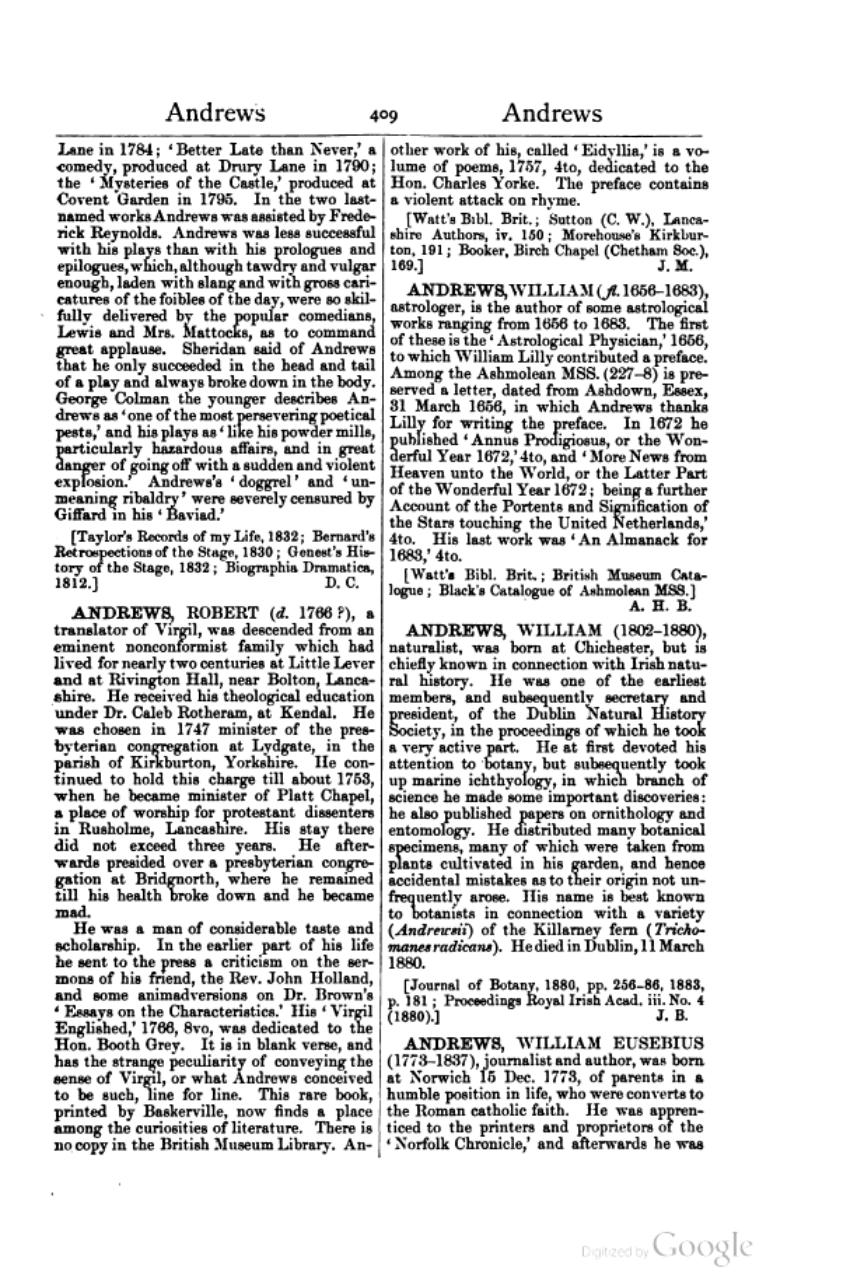Lane in 1784; ‘Better Late than Never,’ a comedy, produced at Drury Lane in 1790; the ‘Mysteries of the Castle,’ produced at Covent Garden in 1795. In the two last-named works Andrews was assisted by Frederick Reynolds. Andrews was less successful with his plays than with his prologues and epilogues, which, although tawdry and vulgar enough, laden with slang and with gross caricatures of the foibles of the day, were so skilfully delivered by the popular comedians, Lewis and Mrs. Mattocks, as to command great applause. Sheridan said of Andrews that he only succeeded in the head and tail of a play and always broke down in the body. George Colman the younger describes Andrews as ‘one of the most persevering poetical pests,’ and his plays as ‘like his powder mills, particularly hazardous affairs, and in great danger of going off with a sudden and violent explosion.’ Andrews's ‘doggrel’ and ‘unmeaning ribaldry’ were severely censured by Giffard in his ‘Baviad.’
[Taylor's Records of my Life, 1832; Bernard's Retrospections of the Stage, 1830; Genest's History of the Stage, 1832; Biographia Dramatica, 1812.]
ANDREWS, ROBERT (d. 1766?), a translator of Virgil, was descended from an eminent nonconformist family which had lived for nearly two centuries at Little Lever and at Rivington Hall, near Bolton, Lancashire. He received his theological education under Dr. Caleb Rotheram, at Kendal. He was chosen in 1747 minister of the presbyterian congregation at Lydgate, in the parish of Kirkburton, Yorkshire. He continued to hold this charge till about 1753, when he became minister of Platt Chapel, a place of worship for protestant dissenters in Rusholme, Lancashire. His stay there did not exceed three years. He afterwards presided over a presbyterian congregation at Bridgnorth, where he remained till his health broke down and he became mad.
He was a man of considerable taste and scholarship. In the earlier part of his life he sent to the press a criticism on the sermons of his friend, the Rev. John Holland, and some animadversions on Dr. Brown's ‘Essays on the Characteristics.’ His ‘Virgil Englished,’ 1766, 8vo, was dedicated to the Hon. Booth Grey. It is in blank verse, and has the strange peculiarity of conveying the sense of Virgil, or what Andrews conceived to be such, line for line. This rare book, printed by Baskerville, now finds a place among the curiosities of literature. There is no copy in the British Museum Library. Another work of his, called ‘Eidyllia,’ is a volume of poems, 1757, 4to, dedicated to the Hon. Charles Yorke. The preface contains a violent attack on rhyme.
[Watt's Bibl. Brit.; Sutton (C. W.), Lancashire Authors, iv. 150; Morehouse's Kirkburton, 191; Booker, Birch Chapel (Chetham Soc.), 169.]
ANDREWS, WILLIAM (fl. 1656–1683), astrologer, is the author of some astrological works ranging from 1656 to 1683. The first of these is the ‘Astrological Physician,’ 1656, to which William Lilly contributed a preface. Among the Ashmolean MSS. (227–8) is preserved a letter, dated from Ashdown, Essex, 31 March 1656, in which Andrews thanks Lilly for writing the preface. In 1672 he published ‘Annus Prodigiosus, or the Wonderful Year 1672,’ 4to, and ‘More News from Heaven unto the World, or the Latter Part of the Wonderful Year 1672; being a further Account of the Portents and Signification of the Stars touching the United Netherlands,’ 4to. His last work was ‘An Almanack for 1683,’ 4to.
[Watt's Bibl. Brit.; British Museum Catalogue; Black's Catalogue of Ashmolean MSS.]
ANDREWS, WILLIAM (1802–1880), naturalist, was born at Chichester, but is chiefly known in connection with Irish natural history. He was one of the earliest members, and subsequently secretary and president, of the Dublin Natural History Society, in the proceedings of which he took a very active part. He at first devoted his attention to botany, but subsequently took up marine ichthyology, in which branch of science he made some important discoveries: he also published papers on ornithology and entomology. He distributed many botanical specimens, many of which were taken from plants cultivated in his garden, and hence accidental mistakes as to their origin not unfrequently arose. His name is best known to botanists in connection with a variety (Andrewsii) of the Killarney fern (Trichomanes radicans). He died in Dublin, 11 March 1880.
[Journal of Botany, 1880, pp. 256–86, 1883, p. 181; Proceedings Royal Irish Acad. iii. No. 4 (1880).]
ANDREWS, WILLIAM EUSEBIUS (1773–1837), journalist and author, was born at Norwich 15 Dec. 1773, of parents in a humble position in life, who were converts to the Roman catholic faith. He was apprenticed to the printers and proprietors of the ‘Norfolk Chronicle,’ and afterwards he was
